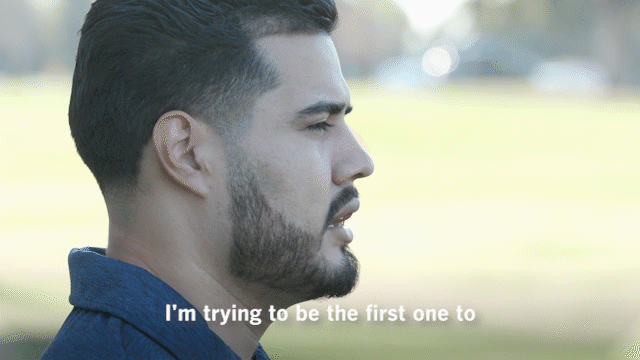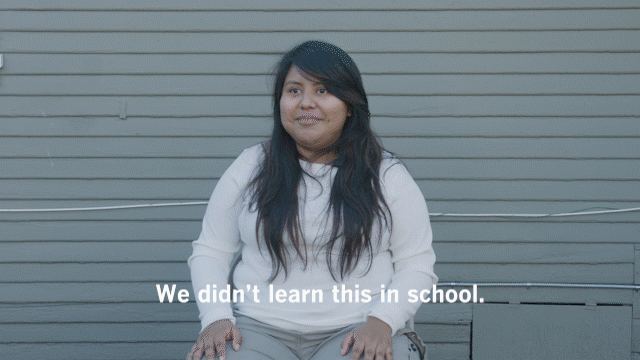Latinx Files: How some Latinxs are looking to create generational wealth

- Share via
I can’t remember the exact details of the moment it dawned on me that I’ll eventually have to take care of my parents when they’re older, but I must have been 4 or 5. My dad got appendicitis and was taken to a hospital across the border. My siblings and I stayed home with an older cousin, and while the adults were gone, I got it in my mind that I’d find every spare coin in the house and start a little fund to cover future catastrophes.
My dad ended up being fine, and having the procedure in Mexico didn’t require tapping into the whopping $10 and change I was able to scrounge — but that reality of needing to repay the sacrifices made on my behalf has been stuck in the front of my brain ever since.
That same sense of obligation can be found in some of the subjects interviewed by my colleagues Jackeline Luna and Samantha Masunaga for their story on Black and Latinx retail investors from South Los Angeles who have taken to platforms like Webull and Robinhood in hopes of building up generational wealth.
“It’s always been on my head that if my parents brought me here when I was 7, I have to make something out of myself,” Royer Levith Elvir, a 23-year-old whose family fled violence in Honduras in 2004, told my colleagues.
The Latinx experience chronicled
Get the Latinx Files newsletter for stories that capture the multitudes within our communities.
You may occasionally receive promotional content from the Los Angeles Times.
Elvir wakes up every weekday at 4 a.m. to start trading in the premarket hours. In addition to retail investing, he’s a full-time electrical engineering student at Cal State L.A. His hope is that his future includes multiple income streams.
Folks like Elvir and Blanca Lopez, a 23-year-old senior home case manager from South L.A., see apps like Robinhood as tools that could help them secure long-term financial security and bridge the wealth gap. According to the Federal Reserve, in 2019 the typical white family had eight times the wealth of a typical Black family and five times the wealth of the typical Latinx family.
“People from here that grew up in the hood, we’re going to be making big money,” Lopez told The Times. “It’s not going to be people coming in to buy their homes, it’s going to be our generation that’s going to be buying properties.”

It bears mentioning that while these platforms have made it easier for people traditionally shut out from the stock market to invest, they have also made it easier for them to lose their money. The biggest culprit is perhaps Robinhood, which has gamified the process of buying and selling stocks, and was at the center of the recent GameStop frenzy.
There’s no guarantee that Elvir and Lopez will achieve their financial goals, but it’s hard not to root for them. Theirs is ultimately a story of young Latinxs literally betting on themselves.
Also, a big shoutout to my colleagues for doing a story on Latinx wealth — it’s a topic I feel doesn’t get much media attention.
Consider subscribing to the Los Angeles Times
Your support helps us deliver the news that matters most. Become a subscriber.
Solidarity with our AAPI sisters and brothers
On Tuesday, eight people were killed by a man who targeted several spas in the Atlanta area. It’s hard to ignore the fact that six of the victims were Asian women.
Even harder is seeing this horrific tragedy as an isolated incident. Hate crimes against the Asian American and Pacific Islander community have risen nationally; this latest act of terror came just one day after the organization Stop AAPI Hate released a report that found 3,795 racially motivated attacks against Asian Americans since the start of the pandemic.
Although this country has a long history of anti-Asian sentiment — some of the first U.S. laws restricting immigration targeted Chinese nationals — the bigotry was surely compounded by former President Trump, who racialized the pandemic by referring to COVID-19 as the “China virus” and “kung flu.”
If these tactics feel familiar, that’s because they’ve been used against our community. The arrival of immigrants from Mexico and Central America is repeatedly painted as a “surge”; Trump began his presidential campaign calling Mexican immigrants rapists and drug dealers. That belief that we don’t belong in this country is what ultimately led a white supremacist to drive 12 hours to El Paso and kill as many people who looked to be Mexican as he could in August 2019.
An attack on one community of color is an attack on all communities of color. As marginalized people, it is our obligation to speak up and call racism out when we see it, even if it’s happening within our own community.
There is also such a thing as intersectionality. There are Latinxs who also identify as Asian, so anti-Asian rhetoric affects us too.
Want to know how to help your AAPI brothers and sisters? Stop AAPI Hate has a helpful guide.
Meet our Latinx staff: Brittny Mejia
The Los Angeles Times employs more than 100 Latinx journalists. One of the goals of this newsletter is for you to meet them all. This week, Brittny Mejia, a Metro reporter who’s provided vital coverage of the effects the pandemic has had on our community (this Column One on COVID-19 devastating a family who shares a one-bedroom apartment is necessary reading), tells us about how it took getting hired by her hometown paper for her family to accept her choice of being a journalist.
As the second in my family to attend a university, the expectation was that I would become a doctor or a lawyer. My parents didn’t understand why I’d pursue journalism as a profession. It was like my tíos all got together to talk about it, because before I started my freshman year, they asked why I couldn’t choose something that would make me more money.
Sophomore year, my parents told me that if my grades dropped, I needed to quit the student newspaper. When I started taking Arabic classes, they tried to convince me to become an analyst. It took my landing at the Los Angeles Times for my parents to understand that this isn’t a hobby for me — it’s my passion.
Thankfully, after immigrating from Mexico, my mom grew up in L.A. and was familiar with the paper (although the stories then felt like they weren’t meant for her). It was that name recognition that finally got my parents onboard. Or else I’d probably still be explaining my decision to become a journalist.
(Barely) anything for Selena’s (legacy)
Selena Quintanilla was awarded the Lifetime Achievement Award at the Grammys this past Sunday, and all she and her fans got were a few seconds of airtime during the hours-long ceremony.
To be fair, the Recording Academy doesn’t make a big deal of this award during the telecast, and Selena wasn’t the only recipient; Grandmaster Flash and the Furious Five, Lionel Hampton, Marilyn Horne, Salt-N-Pepa and the Talking Heads were also honored.
But as my colleague Suzy Exposito notes in her commentary, this was a missed opportunity for the organization to show that it cares about the Latinx audience. “How powerful would it have been to have a few contemporary Latina winners and nominees perform a three-minute Selena medley?” Exposito writes.
“Instead of relegating women like Kali Uchis, Natalia Lafourcade, Lupita Infante and Lido Pimienta to the early-afternoon preshow — alongside many artists nominated in predominantly Black categories like R&B and jazz — how powerful would it have been for Latinas, especially those watching in North America, to see these formidable artists represent one of the most enduring Latina icons in history?”
Selena’s cultural capital remains high. Texas Monthly just announced that its upcoming April issue will be devoted to the Tejano queen (Selena would have turned 50 on April 16). The successful podcast “Anything for Selena,” which explores all aspects of her legacy, just wrapped a few weeks ago. There’s a Netflix series!
It would’ve been such a slam dunk for the Academy to have done something, anything. People would have been talking about it still. Instead, the 2021 Grammys are marred by yet another incident in which a white artist dedicated the top prize to a Black artist.
The best thing on the Latinternet: “La Chona” slaps
Los Tucanes de Tijuana have never won a Grammy — they’ve been nominated five times — but they don’t need no stinkin’ hardware to make bangers that everyone can enjoy.
Take “La Chona,” the 1995 classic staple that can be heard at carne asadas across the Southwest and in the best video I saw online this week.
The Latinx experience chronicled
Get the Latinx Files newsletter for stories that capture the multitudes within our communities.
You may occasionally receive promotional content from the Los Angeles Times.







